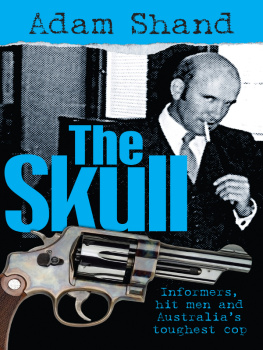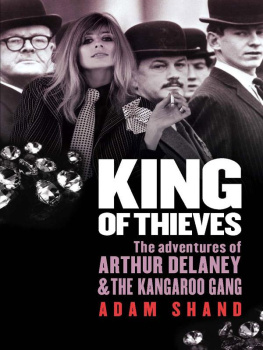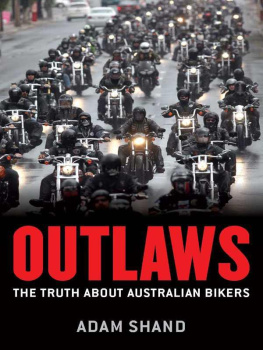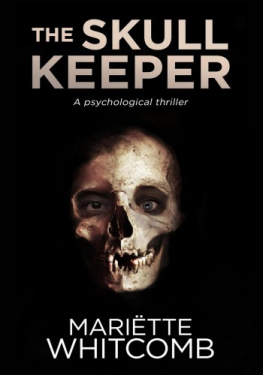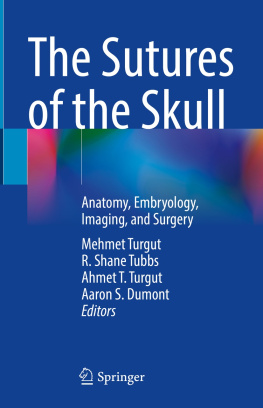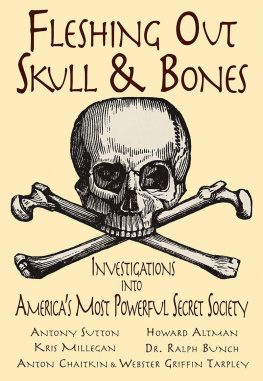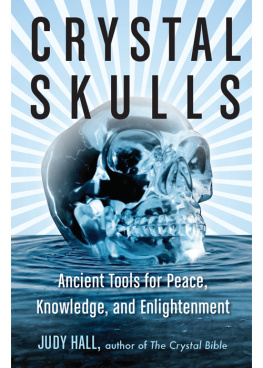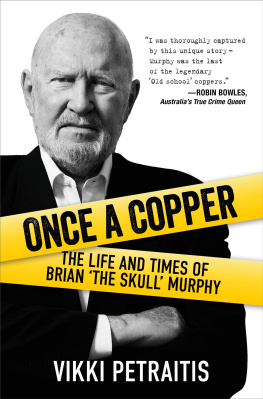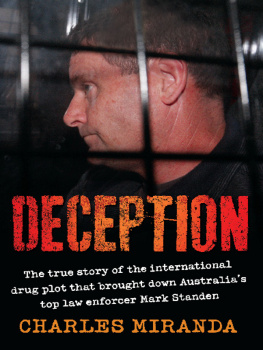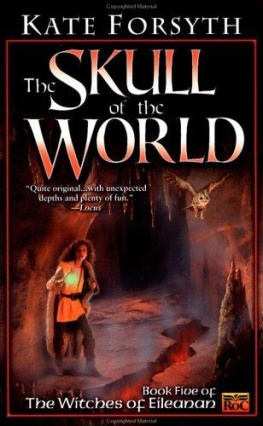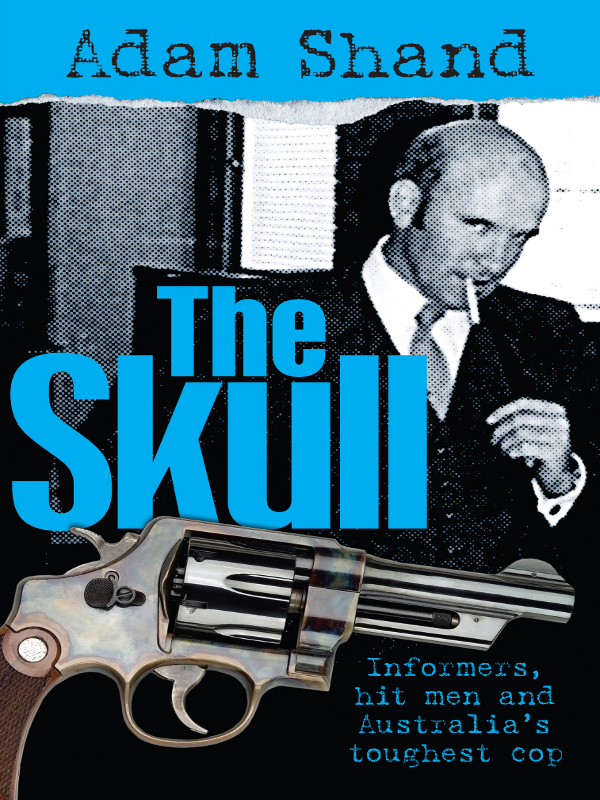
THE SKULL
THE SKULL
INFORMERS, HIT MEN AND AUSTRALIAS TOUGHEST COP
Adam Shand

Published by Black Inc.,
an imprint of Schwartz Media Pty Ltd
Level 5, 289 Flinders Lane
Melbourne Victoria 3000 Australia
email: enquiries@blackincbooks.com
http://www.blackincbooks.com
Copyright Adam Shand 2010
First published by Black Inc. in 2009
ALL RIGHTS RESERVED.
No part of this publication may be reproduced, stored in a retrieval system, or transmitted in any form by any means electronic, mech anical, photocopying, recording or otherwise without the prior consent of the publishers.
Every effort has been made to contact the copyright holders of material in this book. However, where an omission has occurred, the publisher will gladly include acknowledgment in any future edition.
The National Library of Australia Cataloguing-in-Publication entry:
Shand, Adam.
The skull : informers, hit men and Australias toughest cop / Adam Shand.
ISBN: 9781863954822 (pbk.)
Murphy, Brian (Brian Francis).)
Detectives--Victoria--Biography..)
Crime--Victoria--Melbourne.
363.25092
Book design by Thomas Deverall
Printed in Australia by Griffin Press
For Jack and Noliwe Shand
CONTENTS
THIS IS A TAPE-RECORDED INTERVIEW between Constable Paul McGregor and Brian Murphy of 66 Walsh Street, Middle Park, the young officer intoned. Do you agree the time is exactly 8 p.m.?
Correct.
What is your name?
Brian Francis Murphy.
The old man spoke quietly, answering the policeman politely, but there was no doubt who was in command. Through the gloom of the small, dun-coloured interview room, Murphy gazed straight at his interrogator with cold, piercing blue eyes. Even at rest, the irises were round and full, as big as pennies, mesmerising and terrifying at the same time. The shaven head completed an almost idol-like appearance: a burnished skull with sapphire eyes. Even at sixty-two, there were few who dared to hold his stare.
Murphy knew the etiquette, the protocol of a police interview. He had conducted thousands of them in a 33-year career with Victoria Police. Too often, he had found himself on this side of the table, answering the questions. And he knew this interview was going nowhere.
Murphy sighed as he watched the young copper work through his questions: detached and efficient, but utterly without purpose. It was a performance for the cameras and the tape recorders. A report would be filed, the complainant would be advised of the bureaucratic process at regular intervals, but nothing would happen. Nobody really wanted anything to happen.
Constable McGregor was investigating an allegation of indecent language and threatening words. The complainant was an old woman who claimed that Murphy had threatened to shoot her dog. She suspected Murphy also had something to do with the dead rat she had found half decapitated by her back fence.
The only witness, Billy Longley, was unlikely to assist the investigation. Otherwise known as The Texan, Longley was one of Australias most celebrated villains: a gunman and convicted murderer, a legend of the waterfront in his days as secretary of the Painters and Dockers Union. These days, Longley and Murphy were partners in a mediation business, operating under the slogan Everything is negotiable. And Longley knew that reality was the most negotiable and contestable commodity of all. It didnt matter what the truth was what mattered was what the young constable could prove.
To underline the dilemma, Murphy revealed that the complainant had a well-known penchant for making up stories: she spent her nights on the telephone masquerading as a sexy young vixen on a fantasy phone line. There was no reaction from the earnest investigator, but its fair to say the case evaporated at that precise moment. Perhaps an image of taking it to court flashed across his mind. In that moment, he might have pictured Murphy entertaining the magistrate with details of the complainants story-telling skills, the tittering of the court reporter, the roars of derision from his colleagues back at the station, and the hot shame of realising that the power of a policeman was nothing more than the good judgment he possessed.
Its okay, son, Murphy thought to himself. You have learned a valuable lesson today. What you have to realise is that you are always alone as a police officer. Though each of us wears the same uniform, every decision you make is yours forever more. A decision taken in a split-second can be analysed for two years in the highest court in the land. If you come up trumps, the bosses will say well, of course, hes one of ours, thats how we trained him. But get it wrong and no-one will stick to you. They will be saying: I hope you dont own your house.
You didnt have to make a fool of yourself for this old crow.
*
Constable Brian Francis Murphy, badge number 11885, knew early on that he was always alone. He was part of a brave cohort of officers that fought a battle for the streets while Australia slumbered in a post-war dream of peace and prosperity. He may have looked like the other young officers as they marched on the parade ground at Russell Street in 1954, but there was a different drum hammering away in his head. It wasnt long before he realised that some of his most dangerous foes were marching alongside him or watching from the parade stand.
By the end of his career, there would be a thousand stories told about The Skull: the forty men he had shot, the hundreds he had beaten in hand-to-hand combat, the handful of enemies that had mysteriously died, the fear he had struck in the hearts of villains. And he would regret nothing. Once he had worked out his course of action, it was right for him. Let the Privy Council decide for the benefit of society Murphy lived and died in the seconds between cause and effect. And in those moments, there is no-one but yourself to rely on.
In telling this story, I went to Murphys service record to see if all the stories of dash and disobedience told of him could possibly be true. Turning to the disciplinary record, I found it was completely blank. Reality was indeed contestable, and in this life Murphy had won the argument.
Yet every day the same sights and sounds played over and over in his head: the face of a man he was alleged to have killed, the sound of a woman screaming in the dark, to name just two. Some of these things he shared with me, others remain locked away. Blessed or cursed with a vivid, almost perfect recall, Murphy would take them to his grave to face the only judgment that mattered to him.
And even in the face of the Divine Host, he would not be sorry. Not a bit.
PART 1
BLUE CENTURION
AS THE TRAM ROLLED DOWN SWANSTON Street through Melbournes city centre, Reg Murphy could reflect with some satisfaction that he had achieved everything he had ever dreamed of in life.
In his youth, with a shock of white-blond hair, Snowy Murphy had been a street fighter and a knockabout around South Melbourne, a wharfie with an abiding dislike of police. Now his hair had darkened. With his Brylcreemed centre-parting and horn-rimmed spectacles, Reg looked like an entirely different person. His had been a life of transformations. He had entered the world as Reginald Frederick McGlynn, the product of a short, passionate union between his mother, Maude McGlynn, and a Swede named Andersson in Sydney. Later Maude took up with a new man, Willy Horsenail, and relocated to Melbourne, leaving young Reg with a distant relative named Murphy in Sydney. However, when he was six, they decided the boy should be with his mother and packed him off on a boat to Melbourne with a cardboard sign slung around his neck that said
Next page
